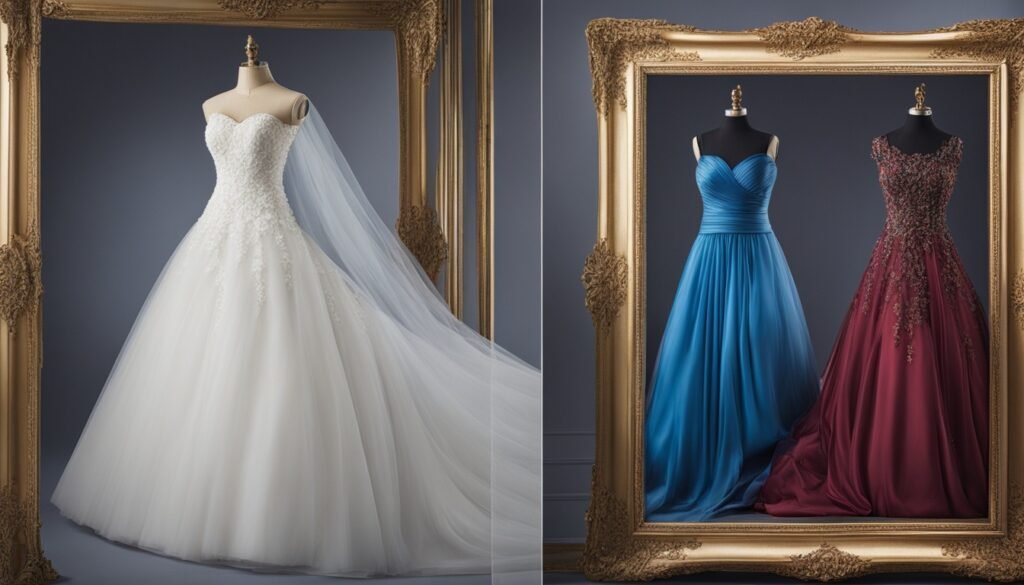Have you ever pondered what happens to a wedding dress post-ceremony?
Believe it or not, but many years ago as a bride, I’ve indeed wondered about this.
Your bridal gown symbolizes more than just fabric; it encapsulates memories. Yet, how do we safeguard these garments for future generations?
I’ve investigated various methods for preserving bridal gowns, from professional services to DIY approaches. Vacuum sealing your wedding dress for long-term storage is often suggested. But, is it indeed the optimal choice?
Wedding dresses are typically made from a blend of materials, including cotton, wool, and synthetic fibers like polyester. Each fabric type has its own aging process, emphasizing the importance of proper care. Through my research, I uncovered some surprising facts about vacuum sealing that challenged my initial thoughts on the subject.
Join me as we explore the intricacies of wedding dress preservation. Together, we’ll uncover the best methods to maintain your gown’s beauty, ensuring it remains as stunning as the day you wore it.
Understanding Wedding Dress Fabrics and Aging
Protecting your wedding dress starts with understanding its fabric composition. Modern wedding gowns feature a variety of materials, each with distinct aging patterns. It’s vital to grasp how these fabrics evolve over time. This knowledge guides us in selecting the optimal wedding dress preservation method.
Common Materials in Modern Wedding Gowns
Today’s bridal fashion showcases a range of fabrics:
- Satin
- Silk
- Charmeuse
- Chiffon
- Organza
- Tulle
- Lace
Each fabric brings its own unique beauty to a wedding dress. However, they all demand specific care to preserve their allure. This knowledge is crucial for safeguarding wedding dresses effectively.
Natural Deterioration Process
Organic fabrics deteriorate naturally over time. This process involves the degradation of long-chain molecules, leading to brittleness. To prevent oxidation dress fibers undergo, controlling environmental factors like humidity and temperature is essential.
Impact of Time on Wedding Dress Fibers
Time impacts wedding gown fibers uniquely. Elements such as light exposure and storage conditions significantly influence their state. By comprehending these dynamics, we can employ preservation strategies that uphold the dress’s integrity. Proper care is indispensable in safeguarding wedding dress memories for future generations.
The Importance of Professional Cleaning Before Storage
Professional cleaning is a critical initial step for wedding dress storage solutions. It’s essential to highlight the significance of this process in maintaining your bridal gown’s integrity for future years. Let’s explore the reasons why skipping this step is not advisable.
Your wedding day was a celebration filled with joy and laughter, but it also brought potential stains. Unseen stains from makeup, body oils, and perfumes accumulated on your dress. These substances can deteriorate fabric fibers, causing discoloration and weakening over time.
Professional cleaners possess the skills to address these issues without compromising the dress’s delicate fabric. They employ specialized methods to eliminate stains and contaminants that could jeopardize your gown’s condition during storage. This detailed cleaning is fundamental to any successful wedding dress storage strategy.
Dust poses a hidden threat to stored wedding dresses. Its tiny particles can cause friction, gradually eroding the fabric. By opting for professional cleaning, you eliminate these particles, safeguarding your gown against deterioration.
- Removes invisible stains and contaminants
- Prevents yellowing and fabric weakening
- Eliminates dust particles that can cause abrasion
- Ensures your dress is ready for long-term storage
I strongly advise finding cleaners who specialize in wedding gowns. They comprehend the distinct requirements of bridal fabrics and handle your dress with the utmost care. By choosing professional cleaning, you’re significantly contributing to the preservation of your bridal gown and the cherished memories it embodies.
Vacuum Seal Wedding Dress: Why It’s Not Recommended
Many brides consider vacuum sealing their wedding dresses as a preservation method. It might seem appealing, but it can actually damage your gown. Let’s delve into why this technique isn’t ideal for storing your treasured dress.
Moisture Trapping and Its Consequences
Vacuum sealing can trap moisture inside the bag, creating an ideal setting for mold and mildew. This can result in dry rot, irreparably damaging the fabric. Instead, opt for breathable storage bags that facilitate air circulation.
Damage to Gown’s Natural Shape
The vacuum sealing process often leads to sharp creases in your wedding dress. These creases are hard to remove and may irreparably damage delicate fabrics. Preserving the gown’s natural shape is essential for long-term storage.
Exposure to Harmful Plastic Fumes
As plastic bags deteriorate, they can emit harmful fumes. These fumes may discolor or damage your wedding dress. To avoid this risk, use acid-free tissue paper and archival boxes for storage.
| Storage Method | Pros | Cons |
|---|---|---|
| Vacuum Sealing | Space-saving | Traps moisture, creates creases, exposes to fumes |
| Breathable Dress Bags | Allows air circulation, preserves shape | Requires more storage space |
| Archival Boxes | Protects from light, dust-free | Can be costly |
I suggest exploring alternative preservation methods that allow your dress to breathe. This approach protects it from environmental factors. Your wedding gown deserves the best care to remain beautiful for years to come.
Ideal Conditions for Wedding Dress Preservation
Creating the perfect environment for long-term dress storage is crucial for maintaining your wedding gown’s beauty. I’ll guide you through the optimal conditions for preserving your cherished dress.
Optimal Temperature and Humidity Levels
For the best wedding dress preservation method, aim for a consistent temperature between 65-70°F (18-21°C). Keep relative humidity at 45-50%. These conditions mimic a comfortable living space and prevent mold growth.

Protection from UV Light
Shield your gown from sunlight to avoid fading and fabric weakening. UV rays can cause irreversible damage, so it’s essential to store your dress in a dark place.
Proper Storage Location in Your Home
Choose a cool, dry spot for your wedding dress. Under the bed or in a closet works well. Avoid attics and basements due to temperature swings. Use acid-free materials to prevent yellowing.
| Storage Factor | Ideal Condition | Why It Matters |
|---|---|---|
| Temperature | 65-70°F (18-21°C) | Prevents fabric deterioration |
| Humidity | 45-50% | Discourages mold growth |
| Light Exposure | Minimal to none | Protects against fading |
| Location | Cool, dry area | Maintains dress quality |
Alternative Preservation Methods for Your Wedding Gown
Preserving your wedding dress is essential for holding onto those precious memories. While vacuum packing bridal gowns might seem appealing, I’ve found superior alternatives to maintain your dress’s condition over time.
Utilizing acid-free boxes or bags is a prime method to safeguard your wedding attire. These containers protect your gown from dust, light, and pollutants while still allowing the fabric to breathe. This method is significantly gentler than vacuum packing, which can trap moisture and harm delicate fabrics.
Professional preservation services provide customized cleaning and packaging for your gown’s unique fabric and embellishments. Experts in this field know exactly how to clean and preserve your wedding dress, ensuring it remains protected for years.
Here are some key preservation methods I recommend:
- Use acid-free tissue paper to prevent creasing
- Employ bust forms to maintain the dress’s shape
- Store in a cool, dry place away from direct sunlight
- Regularly inspect and repackage every few years
By adhering to these steps, you’ll safeguard your wedding dress effectively, avoiding the risks associated with vacuum sealing. Remember, proper preservation ensures your cherished memories remain intact for future generations.
| Preservation Method | Benefits | Drawbacks |
|---|---|---|
| Acid-free box | Protects from dust and light, allows fabric to breathe | Requires space for storage |
| Professional service | Expert cleaning and packaging, tailored to gown type | Higher cost |
| Vacuum sealing | Compact storage | Risk of moisture trapping, fabric damage |
Conclusion
I’ve delved into the world of wedding dress preservation, and it’s evident that vacuum sealing isn’t the optimal choice. Despite its allure as a quick solution, it poses significant risks to your cherished gown. Instead, prioritize proper cleaning and storage to uphold the integrity of your dress.
Initiating the preservation of your bridal gown with professional cleaning is crucial. Subsequently, allocate it to a location that is both cool and dry, shielding it from the harsh effects of sunlight. These actions are pivotal in sustaining the allure of your dress over the years. Acknowledge that your wedding gown transcends mere fabric; it encapsulates a treasure trove of cherished memories.
When it comes to wedding dress storage, steer clear of methods like vacuum sealing that could potentially damage your gown. Adhering to the counsel of experts and employing delicate preservation techniques will guarantee that your gown remains as exquisite as it was on your wedding day. This approach allows you to relive those unforgettable moments at will, preserving the enchantment of your special day.
FAQ
What are the common fabrics used in modern wedding gowns?
Modern wedding gowns are crafted from a variety of fabrics. These include satin, silk, charmeuse, chiffon, organza, tulle, and lace. These materials are primarily organic and naturally deteriorate over time.
Why is professional cleaning important before storing a wedding dress?
Professional cleaning is crucial before storing a wedding dress. Dust particles, makeup, body oils, sweat, and perfumes can damage the fabric over time. Proper cleaning removes these contaminants and prevents long-term deterioration.
Why is vacuum sealing not recommended for wedding dress preservation?
Vacuum sealing is not recommended because it traps moisture, leading to mold growth and dry rot. It also creates sharp creases that can damage delicate fabrics. Moreover, the plastic bags may emit harmful fumes that can discolor or damage the dress.
What are the ideal temperature and humidity levels for storing a wedding dress?
The ideal preservation conditions mimic a comfortable living environment. This means a consistent temperature around 65-70°F (18-21°C) and relative humidity between 45-50%. Avoid extreme temperature fluctuations and high humidity, which can promote mold growth.
How can I protect my wedding dress from UV light?
Protect the dress from UV light to prevent fading and fabric weakening. Store the gown in a cool, dry place away from direct sunlight. This can be under a bed or in a closet.
What are some alternative preservation methods for wedding gowns?
Alternative preservation methods include using acid-free boxes or bags designed specifically for wedding gown storage. Using bust forms to maintain the dress’s shape is also beneficial. Additionally, acid-free tissue paper can prevent creasing. Professional preservation services offer specialized cleaning and packaging tailored to your gown’s specific fabric and embellishments.
Source Links
- https://mydressbox.com.au/blogs/wedding-dress-cleaning-news/why-you-shouldn-t-store-your-wedding-dress-in-a-vacuum-bag?srsltid=AfmBOooQwZDQCWgMT7O-sjhuF12zIoOwUv-EnOOb53xm5nM_n_H62MYt
- https://www.weddinggownpreservationkit.com/vacuum-sealing-your-wedding-gown-a-recipe-for-disaster-pm-blog.html?srsltid=AfmBOopTD8tinNyPOjgAhRP4ny43STMeZ8T6htnheON4a2Y4DHz479LZ
- https://greenercleaner.net/preserving-wedding-gown/
